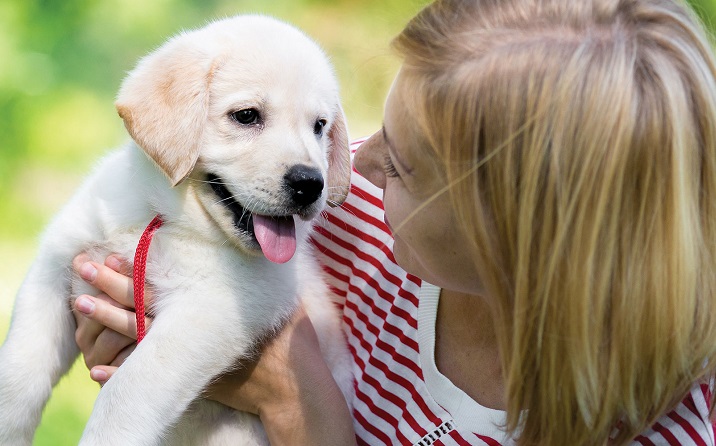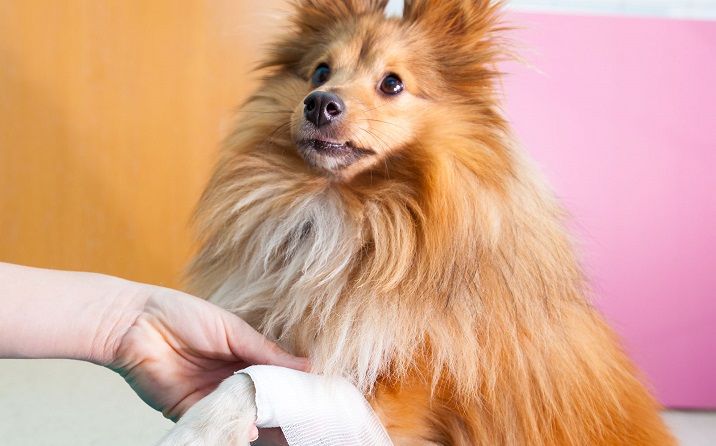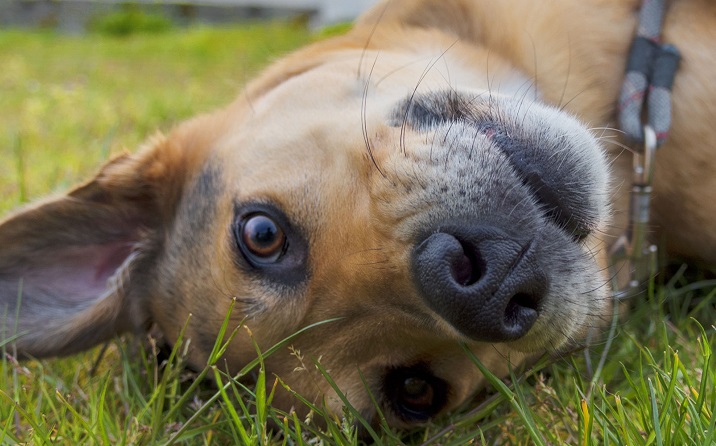What is desexing?
When a dog is surgically desexed, their reproductive system is removed while they are under a general anaesthetic. Desexing of females (also known as spaying, or an ovariohysterectomy) involves removing the ovaries and uterus. Desexing of males (also known as castration or neutering), involves the removal of both testicles.
The benefits of desexing your dog
Desexing offers many health, behavioural and lifestyle benefits for both male and female dogs. Whether you’re looking to prevent unwanted litters or support your dog’s long-term wellbeing, the procedure plays an important role in responsible pet care.
Health benefits for female dogs (spaying)
Desexing female dogs significantly reduces the risk of serious reproductive health issues. It prevents unwanted pregnancies and removes the risk of uterine infections (pyometra), which can be life-threatening. It also eliminates the chance of ovarian cancer and significantly lowers the risk of mammary tumours, especially when the procedure is done before the first heat. It automatically stops their cycle and the associated bleeding and unwanted attention from male dogs that result in pregnancy.
Health benefits for male dogs (neutering)
For male dogs, desexing helps prevent testicular cancer and reduces the risk of prostate disease. It can also protect against hernias and some perianal tumours. These medical benefits contribute to a longer, healthier life and fewer unplanned veterinary expenses. In addition, male urine can smell particularly strong and pungent, and desexing usually prevents this unpleasant odour.
Behavioural improvements
Desexing may help reduce behaviours driven by hormones, including aggression, mounting, territory marking, and roaming. Male dogs often become less fixated on seeking out females in heat, reducing the risk of injury or getting lost. In female dogs, desexing eliminates heat cycles, which can sometimes cause restlessness and unwanted attention from male dogs.
Environmental and social benefits
Desexing helps reduce pet overpopulation and the number of unwanted puppies that may end up in shelters. It’s a proactive step that supports the wider pet community while promoting a safer and calmer home environment.
Greencross Vets highly recommends that you have your dog desexed. This will provide your dog with many health benefits and also prevent more unplanned puppies from ending up in animal shelters. While it is not a legal offence in most Australian states, in the ACT and SA, it is mandatory for you to desex your dog by the time it is 6 months old.
At what age should my dog be desexed?
The right age for desexing your dog can vary depending on their breed and size. Historically, the recommended age for desexing a dog is six months. However, at Greencross Vets we know that each of our patients is unique. Our veterinary team will take into consideration everything that’s special about your dog before giving any recommendations.
What you should know about surgery at Greencross Vets
The goal of any surgery at Greencross Vets is to minimise anxiety for your pet, perform a safe procedure, and eliminate pain during and after surgery. With this in mind, here are a few things you should know about surgery at Greencross Vets…
- pre-anaesthetic test – a blood test will be performed to ensure kidney, liver, blood cells, and electrolytes are within the reference ranges
- fluid therapy – intravenous fluids are given to support blood pressure and organ function
- pain relief – provided before and during surgery, and as take-home medication
- gas anaesthesia – provided via a special tube placed into the airway
- sterile surgery – like human hospitals, we maintain a sterile operating theatre
- monitoring – our dedicated nursing team monitor your pet before, during and after surgery
Microchipping
Apart from in the Northern Territory, microchipping is legally required in Australia. This is a non-invasive, safe way of identifying your dog for life should they ever become lost. Now is a great time to consider microchipping (if not done already), since your dog is already under a general anaesthetic.
Your day
We are often asked whether or not a pet parent should stay at home to care for a pet after surgery. Generally, pets make a speedy recovery after routine procedures, so staying at home with them is not necessary (as long as they have somewhere warm, comfortable, and clean to rest). However, if you are considering making special plans to be with your pet, we suggest you take the day after surgery off rather than the day of surgery.
Your pet’s day
Pre-surgery
After dinner on the night before surgery, remember to withhold all food from your dog. Having an empty stomach when they are anaesthetised reduces the risk that your dog will vomit and aspirate this into their lungs. Please ensure water is present until they arrive at the clinic.
At the vet
Once your pet has been admitted to our ward, we will perform a health check, take some blood for the pre-anaesthetic blood test, and administer a sedative to help your pet relax. After surgery, your pet will recover in a warm, comfortable and quiet environment. Your pet will be treated as if they are our own. Not only will our veterinary nurse continue to monitor them throughout the recovery process, they will also give your pet the attention (and affection) they deserve.
Post-operative care for desexed dogs
After your dog’s desexing procedure, proper aftercare is essential to ensure a smooth and comfortable recovery. Most dogs recover quickly, but it’s important to follow your vet’s advice to avoid complications and support healing.
Limit your dog’s physical activity for at least 10–14 days, keeping them calm and indoors where possible. Prevent them from licking or biting their wound — a cone (Elizabethan collar) may be recommended to protect the surgical site. You’ll also need to monitor the incision daily for signs of infection, such as swelling, redness or discharge, and follow any medication or pain relief schedules provided by your Greencross Vet.
For detailed instructions and tips, visit our Dog & Cat Desexing Aftercare Guide.
WebVet
We’re always by your side when you need us. Contact a Greencross Vet online anytime, anywhere 24/7 via video call. Learn more about WebVet.
Up to 45% off* desexing at Greencross Vets
For a limited time, get 20% off* your pet’s desexing procedure (castrate and spay lines only) at your local Greencross Vets clinic.
Healthy Pets Plus members can enjoy up to 45% off* their pet’s desexing procedure depending on their membership benefits.
Simply call your local clinic to book and quote code DESEX20.
Offer ends 31 August 2025. *Terms and conditions apply. Applicable to spay and castrate lines only.

Frequently Asked Questions
What is the recovery time after desexing?
Most dogs bounce back within 7–14 days, but full healing can take a little longer depending on your dog’s age, size and activity level. It’s important to keep your dog calm and restrict physical activity during this time to prevent wound complications. Always follow your Greencross Vet’s post-operative advice to ensure a safe recovery.
Will desexing change my dog’s personality?
Desexing won’t change your dog’s core personality, they’ll still be the same loving companion. However, the procedure may help reduce hormone-driven behaviours like aggression, mounting, marking and roaming, particularly in males. Many pet owners report a calmer, more focused dog post-desexing.
Are there risks associated with desexing?
As with any surgery, there are small risks associated with anaesthesia and recovery, but complications are rare when the procedure is done by a qualified vet. The long-term health and behavioural benefits of desexing far outweigh the risks for most dogs. Your vet will assess your pet’s health and advise on the best timing to minimise any concerns.

Puppy School
Vaccinations are vital to your puppy’s health. The diseases that vaccinations protect against are serious and often hard to treat, so prevention is key. Get your puppy’s vaccinations up to date now.

Caring for Pets After Surgery
Your pet’s recovery depends on the care you provide them. Follow this guide to ensure your pet receives the right aftercare and has a quick and comfortable healing process after their surgery.

Wellness Health Checks
It is highly recommended that dogs and cats of all life stages receive two wellness health checks per year to ensure their health and for the early detection of diseases.
Healthy Pets Plus Membership Benefits

Vaccinations & Microchipping
- free vaccinations
(as recommended by your Greencross Vet) - free microchipping (if needed)

Consultations
- unlimited consultations

Parasite Prevention
- 20% discount on parasite prevention
- 20% discount on heartworm injection

Pet Emergencies
- unlimited emergency consultations at participating emergency vets. Find them here

 Greencross Vets
Greencross Vets 

